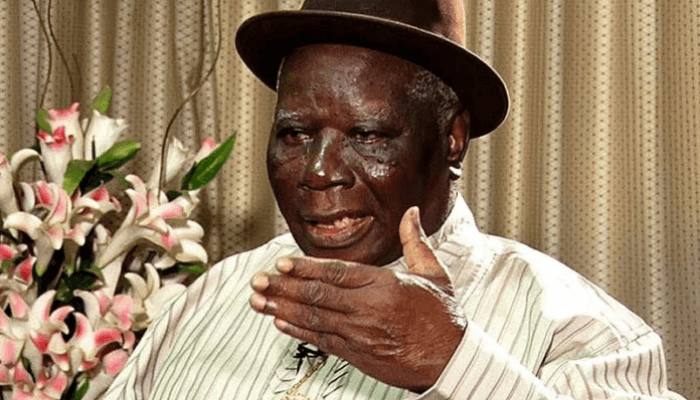For the Niger Delta region and, indeed, Nigeria as a whole, the passing of Chief Edwin Kiagbodo Clark, popularly known as EK Clark, on February 17, 2025, at the age of 97, is a momentous event that brings to an end a life of struggle for the good of his people he loved. It also leaves a legacy that spans decades of selfless service to his people and Nigeria. His death marks the end of an era, but his contributions to the nation and his people, particularly the Ijaw ethnic group, will continue to resonate for generations.
Born on May 25, 1927, in Kiagbodo, a small Ijaw community in present-day Delta State, Chief Clark’s life was one rooted in the values of hard work, integrity, and an unwavering commitment to the welfare of his people. He was a man of profound wisdom, a fierce advocate for justice, and a tireless champion for the rights of the Niger Delta region. His journey from humble beginnings to becoming a towering figure in Nigerian politics was shaped by his love for his heritage and his deep sense of responsibility to his community and the country.
Chief Clark’s early education took him across various schools in Effurun, Okrika, and Afugbene, before he completed his studies at the Government Teacher Training College, which later became Delta State University, Abraka. His academic journey began a lifelong commitment to education, later inspiring his creation of Edwin Clark University in his hometown—a lasting legacy to his people. After a brief career as a schoolteacher, Clark’s intellectual curiosity and ambition led him to travel to the United Kingdom, where he earned a law degree, further refining his skills and gaining the knowledge to empower him to engage with Nigeria’s complex political landscape.
Chief Clark entered politics as a young man, beginning in 1953 when he was elected as a councillor for Bomadi in Delta State. This was the start of his lifelong dedication to public service, and it marked the beginning of his leadership in advocating for the rights of his people. His political career flourished in the following years, and he joined the National Council of Nigeria and the Cameroons (NCNC), which played a significant role in shaping Nigeria’s political trajectory during the pre-independence period.
One of Clark’s most significant national assignments came in 1966 when he was appointed as a Mid-Western Region’s advisory committee member. His political acumen and his ability to understand the complexities of national unity were quickly recognised, and he became a crucial voice in Nigerian politics during the country’s early years of independence. In 1975, under General Yakubu Gowon’s military regime, Clark was appointed Federal Commissioner for Information, akin to today’s minister of information.
As a member of the military government under General Gowon and later as a federal commissioner, Clark was also deeply involved in establishing critical institutions that would shape Nigeria’s future. His tenure as Midwestern Commissioner for Education was particularly notable, as he played an instrumental role in founding the University of Benin. This project would have far-reaching effects on the educational landscape in Nigeria.
Beyond his national political assignments, Chief Clark’s commitment to the Niger Delta region was unwavering. As a self-described leader of the Ijaw people, he dedicated much of his life to advocating for the rights of his people, ensuring their voices were heard in Nigeria’s political discourse.
In 2016, Clark was instrumental in founding the Pan Niger Delta Forum (PANDEF), an organization established to advocate for the restructuring, development, and security of the Niger Delta. The forum quickly became the foremost platform for dialogue on the region’s issues, such as resource control, environmental degradation, and political marginalisation. As the leader of PANDEF, Clark used his position to unite stakeholders and push for meaningful reforms that would benefit the people of the Niger Delta. His leadership in PANDEF reflected his long-standing commitment to his people’s welfare and his ability to unite diverse groups in pursuit of a common goal.
Clark’s legacy as a fearless advocate was not limited to his political career. He was a man who spoke truth to power without fear or favour. His boldness in addressing national issues, particularly those related to the Niger Delta, earned him the respect and admiration of both his supporters and his critics. Candidness of his opinion and his refusal to compromise on his principles made him one of Nigeria’s most respected statesmen. Whether confronting government officials on issues of national importance or advocating for the rights of his people, Clark was unrelenting in his pursuit of justice and equity.
Chief Clark’s death at 97 is the end of an era for Nigerian politics and the Niger Delta. He was a leader, a visionary, and a faithful servant of the people. His influence will continue to shape the nation’s discourse, particularly on regional development, resource control, and the welfare of marginalised communities. He leaves behind a legacy firmly entrenched in the hearts of those who had the privilege of working with him and witnessing his tireless dedication to his people.





